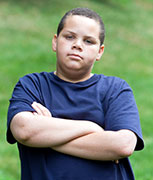- Could Your Grocery Store Meat Be Causing Recurring UTIs?
- Are You Making This Expensive Thermostat Error This Winter?
- Recognizing the Signs of Hypothyroidism
- 10 Strategies to Overcome Insomnia
- Could Artificial Sweeteners Be Aging the Brain Faster?
- Techniques for Soothing Your Nervous System
- Does the Water in Your House Smell Funny? Here’s Why
- Can a Daily Dose of Apple Cider Vinegar Actually Aid Weight Loss?
- 6 Health Beverages That Can Actually Spike Your Blood Sugar
- Treatment Options for Social Anxiety Disorder
Less Sleep in Teen Years Tied to More Pounds at 21


Lack of sleep not only puts teens at risk for poor grades, it also puts them at increased risk for obesity, researchers warn.
The study authors analyzed data collected from more than 10,000 Americans when they were aged 16 and 21. Nearly one-fifth of them got less than six hours of sleep a night when they were age 16, and this group was 20 percent more likely to be obese at age 21 than those who got more than eight hours of sleep per night at age 16, the investigators found.
Although lack of exercise and too much time spent watching television were also risk factors for obesity, these behaviors did not account for the link between lack of sleep and obesity, according to the study published online recently in the Journal of Pediatrics.
“Lack of sleep in your teenage years can stack the deck against you for obesity later in life. Once you’re an obese adult, it is much harder to lose weight and keep it off. And the longer you are obese, the greater your risk for health problems like heart disease, diabetes, and cancer,” study author Shakira Suglia, an assistant professor of epidemiology at the Mailman School of Public Health at Columbia University in New York City, said in a university news release.
“The message for parents is to make sure their teenagers get more than eight hours a night. A good night’s sleep does more than help them stay alert in school. It helps them grow into healthy adults,” Suglia added.
Teens should get nine to 10 hours of sleep a night, according to the U.S. Centers for Disease Control and Prevention.
It’s known that daytime sleepiness and fatigue affect what and how people eat by triggering cravings and altering appetite. For example, sleep-deprived people find it easier to buy calorie-laden fast food rather than preparing a healthy meal.
More information
The U.S. Centers for Disease Control and Prevention has more about sleep.
Source: HealthDay
Copyright © 2026 HealthDay. All rights reserved.










